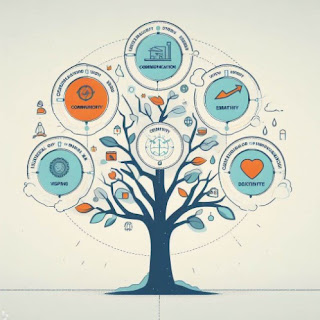Mastering the Art of Leadership: Six Essential Leadership Skills
Table of Contents
6 Leadership Skills - Leadership is a dynamic and multifaceted practice that plays a pivotal role in organizations, communities, and personal life. Effective leaders possess a diverse set of skills that enable them to inspire, guide, and drive positive change. In this article, we will explore six essential leadership skills that are crucial for success in any leadership role.
Mastering the Art of Leadership: Six Essential Leadership Skills
Communication: The Foundation of Leadership
- Communication is the cornerstone of effective leadership. Leaders must be skilled at conveying their vision, goals, and expectations clearly and persuasively. This includes active listening, as understanding the needs and concerns of team members is just as important as expressing your own thoughts. Effective communication fosters trust, collaboration, and a sense of unity among team members.
Decision-Making: The Art of Making Informed Choices
- Leaders often find themselves in situations where decisions must be made. The ability to make sound, well-informed decisions is a fundamental leadership skill. Leaders should gather relevant information, analyze the pros and cons, and take calculated risks when necessary. Decisiveness is crucial in guiding a team or organization toward its objectives.
Adaptability: Navigating Change with Grace
- In a rapidly changing world, adaptability is a valuable leadership skill. Leaders must be open to new ideas, flexible in their approaches, and willing to pivot when circumstances demand it. Adaptable leaders can navigate uncertainty and guide their teams through transitions while maintaining stability and composure.
Empathy: Understanding and Connecting with Others
- Empathy is the ability to understand and relate to the feelings and perspectives of others. It is a crucial skill for effective leadership as it allows leaders to connect with their team members on a deeper level. Empathetic leaders build trust, motivate their teams, and create a positive and inclusive work environment.
Conflict Resolution: Navigating Differences Constructively
- Conflicts are inevitable in any group setting. Leaders must be skilled in managing and resolving conflicts constructively. This involves mediating disputes, finding common ground, and fostering compromise. Effective conflict resolution promotes harmony and helps maintain a productive and healthy team dynamic.
Inspiration: Motivating and Encouraging Others
- Inspiration is the ability to motivate and encourage others to achieve their best. Inspirational leaders set a positive example, provide a clear vision, and empower their team members to reach their full potential. By fostering a sense of purpose and enthusiasm, they drive the collective effort toward success.
Conclusion:
Leadership is an ever-evolving practice that demands a diverse skill set. These six essential leadership skills - communication, decision-making, adaptability, empathy, conflict resolution, and inspiration - form the bedrock of effective leadership. When cultivated and combined, these skills empower leaders to inspire their teams, make informed decisions, adapt to change, connect with others, manage conflicts, and create a positive, productive work environment.
To become a successful leader, continuous learning and practice are essential. By honing these skills, individuals can enhance their leadership capabilities and lead their teams and organizations toward greater achievements and success.
FAQ 6 Leadership Skills
Frequently Asked Questions (FAQ) - 6 Leadership Skills
What are the six essential leadership skills?
The six essential leadership skills are communication, decision-making, adaptability, empathy, conflict resolution, and inspiration.
Why is communication considered a foundational leadership skill?
Communication is fundamental because it allows leaders to convey their vision, build trust, and facilitate collaboration among team members. Effective communication is the basis for all other leadership skills.
How can I improve my decision-making skills as a leader?
To enhance your decision-making skills, gather relevant information, analyze options, consider the potential outcomes, and make choices based on well-informed judgment. Practice and experience also contribute to better decision-making.
Why is adaptability important for leaders?
Adaptability is crucial because the business and organizational landscapes are constantly evolving. Leaders who can adapt to change and embrace new ideas are more likely to guide their teams successfully through challenges and uncertainties.
What role does empathy play in leadership?
Empathy enables leaders to understand and connect with their team members on a deeper level. It fosters trust, motivates employees, and creates an inclusive and supportive work environment.
How can leaders effectively resolve conflicts within their teams?
Conflict resolution involves mediating disputes, finding common ground, and encouraging compromise. Leaders should create an atmosphere where team members feel heard and valued while maintaining a focus on the team's goals.
What does it mean to be an inspirational leader?
Inspirational leaders motivate and encourage their teams to achieve their best. They set a positive example, provide a clear vision, and empower team members to reach their full potential. They foster a sense of purpose and enthusiasm to drive the collective effort towards success.
Can leadership skills be learned and improved over time?
Yes, leadership skills can be developed and improved with practice and continuous learning. Effective leaders invest in personal and professional growth to enhance their leadership capabilities.
Are these six skills equally important for all types of leaders?
The importance of these skills can vary depending on the leadership context. While all these skills are valuable, their significance may differ based on the specific needs and requirements of different leadership roles or industries.
What resources are available for individuals looking to develop their leadership skills?
Resources for leadership skill development include books, courses, workshops, mentorship programs, and professional associations. Networking and seeking feedback from peers and mentors are also valuable avenues for growth.

